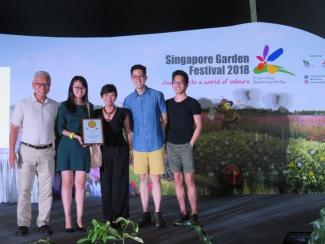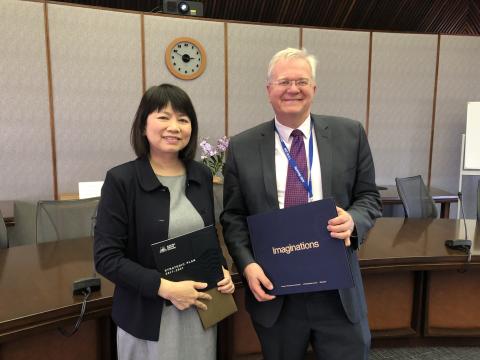
In recognition of its efforts to cultivate an urban farm in the very heart of the city, SMU GROW and Sustainability achieved the Gold standard in the Community in Bloom Competition for the second consecutive time.
Organised by the National Parks Board (NParks), the national competition received a record number of participants from more than 500 gardens in Singapore this year. The awards, which are held every two tears, recognise the high garden standards and community development displayed in these gardens, as well as the relentless passion of gardening members in maintaining the vibrant beauty of each community garden.
The number of educational institutions participating in the national competition this year rose to 148, from 113 two years ago. Participants who earned a gold standard scored highly in the competition’s three criteria:
- Garden quality and the environment – aesthetics, plant health, cleanliness and safety, incorporation of new techniques;
- Level of community involvement – volunteer numbers, gardening activities, outreach, participation in NParks events;
- Biodiversity quality – efforts to reduce environmental impact, and habitat enhancement.
SMU GROW and Sustainability emerged as a winner by clinching its second consecutive gold. The award served as a testament to the commitment, ever-increasing standards, and strides made by the SMU community of students, staff and faculty.
SMU GROW, SMU’s sustainability movement, under the Office of the President, was born out of a desire to leave a lasting legacy – to learn, to give, and to reconnect with what’s most fundamental to life – Nature. It was felt that the simple act of planting could cultivate change through experiential and reflexive learning.
An organic, urban farm on the ground level of the School of Accountancy was set up in 2015 to bring students, staff and faculty together to learn and share skills, and planter boxes and plots were made available for adoption.
In the past year, in line with a national push towards being a “Smart Nation”, SMU GROW and Sustainability has injected technology into its planting efforts.
Case in point, a special bio-water planter system was installed to support high intensity urban farming. This comprised customised combinations of sand and humisoil in the planters to provide high carbon nutrient media that allows plants to grow with good airspace and drainage. Plants are protected from parasitic diseases with the integration of a misting system with bio-defender sprays that contain beneficial probiotics.
The SMUgBUG, a plant buddy, is another example of harnessing technology to monitor plant health. A prototype of an internet connected device fashioned in the form of SMU’s mascot, the SmooSmoo lion, the SMUgBUG is placed in the field alongside plants. SmooSmoo sends out an e-mail when the plants are thirsty or under less-than-ideal conditions using an array of simple sensors, from moisture, humidity and light to respectively detect soil wetness, air temperature and sunlight exposure. These sensors are connected up to an Internet of Things (IOT) device that forms SmooSmoo’s brain.
Conceived as a hands-on DIY kit and workshop, instead of an off-the-shelf product, the SMUgBUG consists of programmable parts designed to engage tech-savvy and otherwise nature-averse tech students and professionals to leverage their familiarity with technology and get out into nature, roll up their sleeves and play a bit in the sun and dirt. Each SMUgBUG is hand-built to suit the needs of the plants being monitored, as the plants grow, so does the smart tech around it.
A workshop was held for students and faculty involved in the IoT and Smart Cities courses at the School of Information Systems (SIS). Subsequently, a cross-functional, cross-disciplinary team was set up to establish an IoT plot at the SMU GROW garden, with a team of students undertaking a project to analyse and present their findings during SIS’ Poster Day
Over the past year and a half, SMU GROW projects have also been integrated into students’ community service hours to encourage students to immerse themselves in urban farming and sustainability, to proactively seek solutions to address practical issues, and to engage members of the public, especially neighbouring communities.
Team BaeSILS set out to promote the health benefits of plants and to spark youth’s interest in horticulture. Besides helping to maintain the SMU GROW plot, the team conducted research, planted herbs and conducted training sessions for students and the SMU community. Team Ecotopia worked on converting campus food waste into fertilisers and topsoil, which are used in the SMU plot. The team also campaigned for the reduction of food waste through food waste characterisation studies at orientation camps and the alumni bistro, B3.
SMU GROW has also contributed to local business sustainability by pioneering the “Save the Uglies Market”. Taking place every Friday at SMU’s B3 café since October 2017, this was aimed at educating and rallying the community to reduce food waste, and change mindsets about produce and products that are often rejected for cosmetic reasons, not just by retailers, but by shoppers too.
Benefits are three-fold: local businesses are able to recover some costs of produce and products that would otherwise be thrown away for not meeting aesthetic standards; consumers purchase high quality products at about half the retail price; and sales proceeds go towards organising more initiatives to promote green practices.

In an open invitation, members of SMU GROW and Sustainability welcome more students, staff and faculty to visit the plot: “When you pass the SMU GROW plot at the ground level of School of Accountancy, do stop to smell the herbs, and say hello to our rich variety of fauna. That will be the best way to thank all those who have made SMU GROW garden an award-winning labour of love!”
It takes a community to raise a garden…meet the people (and creatures) behind the gold standard of SMU GROW & Sustainability. Click here to find out more.